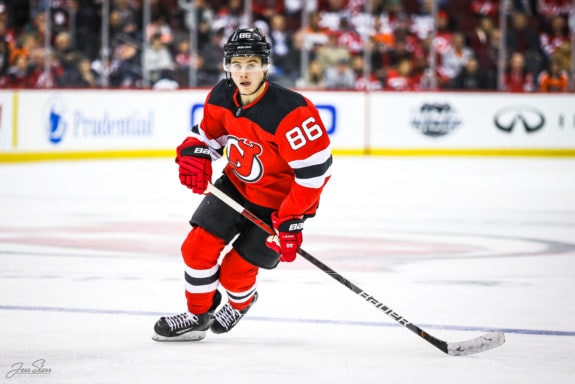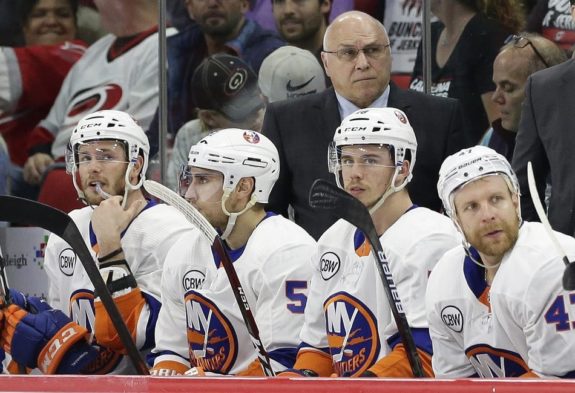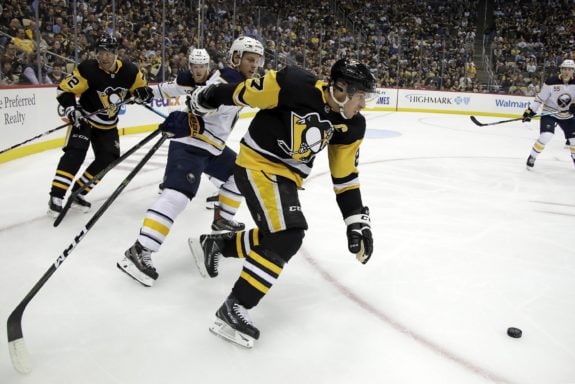It’s been said a hundred times already, but it’s worth repeating: this will be an NHL season unlike any other. That will be especially true when it comes to the schedule, as the 56-game slate will consist solely of inter-divisional matchups.
Those divisions themselves will look quite different for some teams, including the Buffalo Sabres. Playing in the newly-christened East Division — or, if you want to be official, the MassMutual NHL East Division — the only team that will be following the Sabres from the old Atlantic Division is the Boston Bruins.
Outside of their longtime rivals, the Sabres will face a brand new set of divisional opponents in 2020-21, all of them coming from the old Metropolitan Division. The East looks like it will be one of the toughest divisions in the league, with each team providing their own unique challenges for Buffalo to deal with. Since each team will play the others eight times, those matchups will be more important than ever.
Boston Bruins
The Bruins will provide a semblance of normalcy for Sabres fans. The two teams have been division rivals going back to the beginning of the Buffalo franchise, a history filled with countless memorable showdowns and moments (May Day, anyone?).
Unfortunately for the Sabres, the Bruins once again look like a Stanley Cup contender. While the Tampa Bay Lightning eventually won the Cup last season, it was actually the Bruins who won the Presidents’ Trophy with a 44-14-12 campaign in 2019-20.

While Boston suffered some notable losses on the blueline in Torey Krug and Zdeno Chara, it’s still led up front by the Perfection Line of Brad Marchand, David Pastrnak, and new captain Patrice Bergeron. Add in one of the league’s best goaltending duos in Tuukka Rask and Jaroslav Halak, and the Sabres will be fortunate to break even in their season series against coach Bruce Cassidy’s squad.
New Jersey Devils
The Devils might represent Buffalo’s most favorable matchup within the division. After starting the 2019-20 season as a trendy playoff pick, New Jersey crashed and burned to the tune of a 28-29-12 record. The silver lining is that with much lower expectations for 2020-21, the Devils might be able to play a little looser without so much pressure.

Former first overall pick Jack Hughes figures to bounce back after a dreadful rookie season that saw him net just 21 points in 61 games. He leads a solid top six that includes under-the-radar names like Andreas Johnsson, Kyle Palmieri, and Nikita Gusev. The Devils also boast a potentially great goaltending duo in the newly-acquired Corey Crawford and Mackenzie Blackwood, who was one of the team’s lone bright spots in 2019-20.
New York Islanders
The Isles are a tough team to figure out. They’re coming off a season in which they were two games from the Stanley Cup Final despite having allowed more goals than they scored in the regular season.
While their talent doesn’t rank with the best in the league, the Islanders are one of the most well-coached teams in the NHL under Barry Trotz. Even with the loss of Devon Toews on the blueline, New York should have one of the better defenses around on the strength of the Russian goaltending duo of Semyon Varlamov and Ilya Sorokin.

The Islanders are also extremely strong down the middle: Mathew Barzal, Brock Nelson, Jean-Gabriel Pageau, and Casey Cizikas give New York a legitimate top-nine center on every line. It’s the kind of team depth the Sabres have been searching for for years.
New York Rangers
Not many teams have a brighter future than the Blueshirts. Despite being swept out of the Preliminary Round by the Carolina Hurricanes, the Rangers netted the number one pick in the 2020 Draft, promptly selecting Canadian phenom Alexis Lafreniere. He joins a roster stacked with young talent that’s only going to get better. New York also boasts veteran studs in the likes of Artemi Panarin, Mika Zibanejad, and Chris Kreider.
While the Rangers don’t possess the depth required to be a serious contender, their sheer talent will be enough to win out on some nights against teams like the Sabres.
The big question for the team lies in net, where Igor Shesterkin and/or Alexandar Georgiev will look to replace departed franchise legend Henrik Lundqvist.
Philadelphia Flyers
A lot of folks see the Flyers as a dark horse Stanley Cup contender, and with good reason: Philly was one of the most complete teams in the NHL last season, finishing in the top 10 in both goals scored and allowed.
Alain Vigneault’s group will look very similar in 2020-21. Claude Giroux and Sean Couturier lead a forward group that’s among the deepest in the league. Ivan Provorov headlines a defense corps that’s short on star power but doesn’t have many weak links. And Carter Hart looks like he could be the franchise’s long-sought savior in net.

The Flyers don’t boast the elite high-end talent that can match up with the likes of the Lightning, Colorado Avalanche, or Toronto Maple Leafs, but it’s hard to look at their roster and find many weaknesses.
Pittsburgh Penguins
The Penguins find themselves in an interesting position as a franchise. While they are a consistent playoff participant — 14 seasons in a row and counting — they haven’t made it past the second round since their last championship in 2016-17. Most recently, this included an embarrassing 3-1 defeat at the hands of the 24th-place Montreal Canadiens.
All that said, Pittsburgh still has Sidney Crosby and Evgeni Malkin, so you can likely pencil them in for another trip to the playoffs. In addition to the two future Hall-of-Famers, Jake Guentzel and Bryan Rust were both point-per-game players last season, and help give the Penguins as good a top four set of forwards as any team in the NHL.

Pittsburgh also boasts an underrated defense corps that includes Kris Letang, John Marino, and Brian Dumoulin. While the Sabres have played the Penguins better in recent years (4-4-1 over the past three seasons), Crosby and Malkin have dominated Buffalo for most of their careers.
Washington Capitals
Washington is in a similar situation to Pittsburgh: not far removed from a Stanley Cup but with a core that seems like its window of contention is shutting fast. While the Capitals once again boasted a high-scoring attack in 2019-20, they were quickly bounced out of the playoffs in five games by the Islanders.
The Capitals have the look of a team with a high floor and a low ceiling, one that should make the playoffs without much problem but likely won’t go very far once they’re there. The offense should once again be stellar, with Alex Ovechkin, Nicklas Backstrom, Evgeny Kuznetsov, T.J. Oshie, and John Carlson still around to fill up the net.
The late addition of Zdeno Chara also adds another player with championship pedigree to a team that already has plenty. Just like the Penguins, it would be unwise to count the Capitals out just yet.
The Sabres received a tough draw when the NHL realigned its divisions. They went from getting to play a pair of bottom-feeders in the Detroit Red Wings and Ottawa Senators to a division that features six teams who were in the expanded 2020 playoff field. Buffalo undoubtedly got better this offseason, but playing against such tough divisional opponents every night, they might not see progress in the standings.